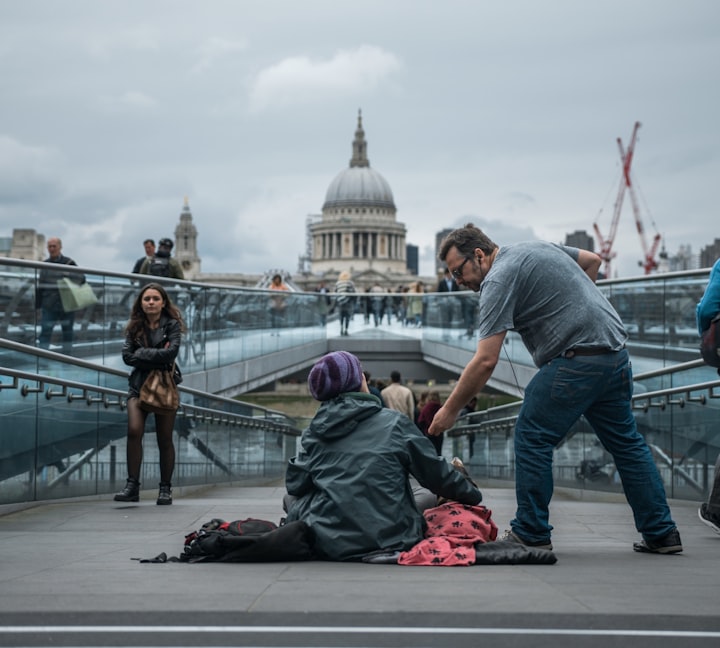Nightmare-crushing pill helps alcoholics with PTSD get sober
How the medication Prazosin has changed my life

Editor's note: A previous version of this article appeared on News Break.
I never used to have nightmares.
I dreamed a lot, especially during my drinking days. Most often, my dreams were funny.
But then, I experienced unthinkable trauma.
I was assaulted inside a jail in 2015 where I was held on no charges at all. Someone got into my house while I slept and assaulted me around that time, too.
The person had a key, police believe. Dad never changed the locks when he bought the house.
Giving further details of the trauma I experienced only will upset me. The point is this: The nightmares disrupted my sleep and my life.
I would wake up others in the mental hospital screaming and kicking my feet during a nightmare.
Then my doctor prescribed Prazosin. I stopped having nightmares almost immediately. One recurring nightmare was that my feet were tied together and I was being loaded onto an airplane.
Mental hospital helps me turn my life around
My trauma was so haunting I ended up in a state mental hospital for several months. After first being treated by a purple-haired doctor who didn’t listen, I insisted on a new doctor.
One of the first things the new doctor did was prescribe Prazosin. The pill is either green and brown (camouflage colors) or pink and white. It comes in capsule form.
Before Prazosin, the nightmares would leave me scared frozen, sometimes shaking. A 2014 study published in Psychiatry Practice explained most other medications for PTSD don’t work.
Cognitive behavioral therapy, or counseling, also often fails in the treatment of chronic PTSD, according to the research.
My entire life has been traumatic, from beatings as a child, to losing my mother young, to the terror that ensued when I began writing about political corruption in Rock Island, Ill.
Bipolar disorder, which I have, can be caused by trauma. You’re not always born with it.
How does Prazosin work?
A 2007 study in Annals of Pharmacotherapy explained Prazosin's mechanism of action. The drug works by decreasing arousal brought on by norepinephrine. Norepinephrine is known as the stress hormone. It is released into the body when the brain perceives trauma.
People with PTSD live with what are called “triggers.” For example, if you were beaten in a jail and you read a story about jail abuse 10 years later, you may begin to relieve the experience.
The memories will seem so real, your body will start producing norepinephrine. Without a drug like Prazosin, you will experience fear, a pounding heart, and a feeling of fight or flight if you have PTSD.
The research analyzed all previous studies about Prazosin and PTSD. “Despite various limitations, all of the studies showed significant improvements in the sleep-related symptoms of PTSD following the addition of Prazosin therapy,” the authors reported.
“Prazosin appears to be a promising and fairly well tolerated agent for the management of PTSD-related nightmares and sleep disturbances,” the research concluded.
Research in 2003 showed the drug was well-tolerated. Prazosin proved its mettle in a placebo-controlled study of Vietnam Veterans with PTSD who experienced nightmares.
One drawback to the research were small sample sizes of between 4 and 59 patients.
Prazosin helps alcoholics stay sober
Many people with PTSD turn to alcohol. They are trying to numb their pain.
The problem is, drinking alcohol is like throwing gasoline onto a fire for people with PTSD. Many people with PTSD try to get sober and fail.
Prazosin can help them find success in sobriety, according to 2014 research published in the journal Psychiatric Practice. “Prazosin also has been studied in younger and older adults with PTSD and in patients with alcohol problems, in whom it was found to reduce cravings and stress responses,” the authors reported.
Research echoes my experience with Prazosin: It works quickly and without side effects in most people. It works when almost everything else fails.
“Prazosin offers some hope for treating resistant cases of PTSD in which recurrent nightmares are problematic, with a relative rapid response within weeks,” according to the study in the journal Psychiatric Practice.
Seroquel helps with my PTSD, too
Another medication I take also has proven helpful in managing PTSD symptoms. Studies show the antipsychotic Seroquel helps people stay engaged in therapy, too.
A study published in Psychopharmacology Bulletin found Seroquel significantly quelled intrusive memories and helped PTSD patients sleep better. “Insomnia can be a difficult problem to treat in PTSD patients, therefore quetiapine (generic for Seroquel) should be considered in difficult cases.”
In yet another study published in the journal Military Medical Resident, the researchers explain, “VA/DOD guidelines identify trauma-focused psychotherapy as the best evidence-based treatment for PTSD, but overall effectiveness is limited by reduced levels of patient engagement and retention.”
The downside to Seroquel is weight gain. But my doctor also prescribed me Metformin, which helps keep my weight under control.
Do you suffer from PTSD? Don't give up on peace
Do you suffer from PTSD? If so, talk to your doctor about Prazosin or Seroquel. A combination of Seroquel, Prazosin, and an antipsychotic called Invega have helped stabilize me.
I take Invega by injection once every three weeks. I have not noticed any side effects.
I have been on Prazosin a year and have not experienced any side ffects.
Research published in European Neuropsychopharmacology has shown Invega helps manage symptoms of mania.
“Manic” is where I usually fall on the bipolar scale when symptoms flare up. Mania and fear often go together when experiencing PTSD flashbacks.
Nothing is worse than reliving a bad experience. Such trauma can cripple you. It can leave you feeling helpless.
PTSD is common, with more than 3 mllion cases per year in the U.S. Often times, the symptoms are lifelong.
According to the VA, about 7-8 percent of Americans will experience PTSD at some point in their lives.
Don’t continue to suffer with PTSD without seeing a doctor. There are medications that might help you feel better, too.
About the Creator
David Heitz
I am a journalist with more than 30 years' experience. Here at Vocal, I write mainly for Potent, Vocal's cannabis magazine. I have a PTSD diagnosis and a medical cannabis card. I have lived in a penthouse and also experienced homelessness.






Comments
There are no comments for this story
Be the first to respond and start the conversation.